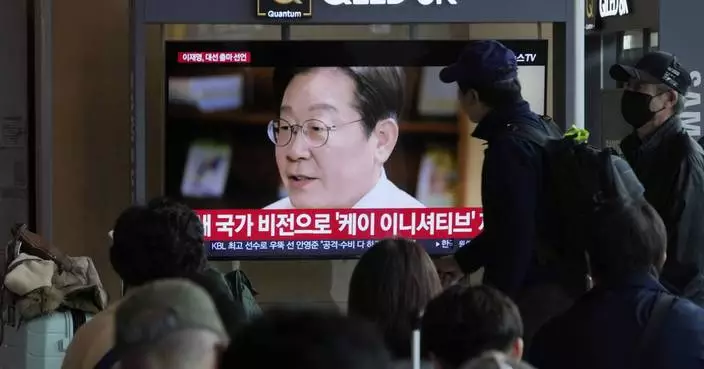PARIS (AP) — Unbeaten Paris Saint-Germain has won Ligue 1 in early April with six games to spare.
Only the 2016 PSG side has won the French league earlier.
Click to Gallery
PSG's Bradley Barcola walks on the pitch during the French League One soccer match between Saint-Etienne and Paris Saint Germain at the Geoffroy-Guichard stadium in Saint-Etienne, France, Saturday, March 29, 2025. (AP Photo/Laurent Cipriani)
PSG's Goncalo Ramos kicks the ball ahead of Angers' Florent Hanin during the French League One soccer match between Paris Saint-Germain and Angers at Parc des Princes stadium in Paris, Saturday, April 5, 2025. (AP Photo/Michel Euler)
PSG's Desire Doue, centre, celebrates after scoring his side's opening goal during the French League One soccer match between Paris Saint-Germain and Angers at Parc des Princes stadium in Paris, Saturday, April 5, 2025. (AP Photo/Michel Euler)
PSG's head coach Luis Enrique, centre, celebrates winning the French League One championship title after the soccer match between Paris Saint-Germain and Angers at Parc des Princes stadium in Paris, Saturday, April 5, 2025. (AP Photo/Michel Euler)
PSG's Khvicha Kvaratskhelia, centre, challenges for the ball with Angers' Florent Hanin during the French League One soccer match between Paris Saint-Germain and Angers at Parc des Princes stadium in Paris, Saturday, April 5, 2025. (AP Photo/Michel Euler)
Paris Saint-Germain players throw PSG's head coach Luis Enrique in the air after they won the French League One soccer match between Paris Saint-Germain and Angers at Parc des Princes stadium in Paris, Saturday, April 5, 2025. (AP Photo/Michel Euler)
Here's a closer look at how PSG clinched a record-extending 13th Ligue 1 title under coach Luis Enrique, who was criticized at the start of the campaign because of the team's ineffective style of play.
Time and again, Kylian Mbappé bailed out PSG with late equalizers or winners during his final seasons with the club. For all of Mbappé’s undoubted ability and a club-record 256 goals, his heroics masked glaring deficiencies elsewhere.
The midfield was a bit soft and the defense often panicked under pressure in big games, with those factors leaving their goalkeeper too often exposed.
After Mbappé left for Real Madrid in the offseason, Luis Enrique had work to do.
He set things straight by saying Mbappé could not be replaced as a scorer and that results had to come through far better teamwork. He preferred to have several players chipping in regularly with goals, rather than spending another fortune on a superstar scorer who might also take time to settle in.
Young players such as 22-year-old Bradley Barcola, who has 18 goals this season, and 19-year-old Désiré Doué became symbols of a new-look PSG less dependant on big names.
Under Luis Enrique there has been no pampering of egos and preferential treatment for stars like in previous years when the likes of Neymar, Edinson Cavani and Zlatan Ibrahimovic were overly indulged.
Luis Enrique proved that point with a bold decision to drop forward Ousmane Dembélé on disciplinary grounds for a big Champions League game at Arsenal.
PSG lost that game 2-0 but the Spanish coach, although sometimes perceived as stubborn, made it crystal clear he was looking for dedication in his squad and he was non-negotiable on this point.
He was unhappy with Dembélé’s level of commitment at the time. So rather than shy away and meekly acquiesce to player power like some of his predecessors, Luis Enrique stood by his decision and was eventually proved right as Dembélé's form soared.
Before this season, Dembélé was widely seen as a lightning-fast and skilful right winger who got into great scoring positions but was a wasteful finisher.
His previous season-best goal tally stood at a modest 14 in 48 games overall for Barcelona during the 2018-19 campaign, and he had only once reached double figures in the league with 12 for Rennes in 2015-16.
But a decisive tactical switch by Luis Enrique paid huge dividends. He released Dembélé from his restrictive role as a winger and played him through the middle in a roaming role which also allowed him to drift to the wings.
The result has been emphatic, with Dembélé topping the Ligue 1 scoring charts with 21 goals and 32 overall.
Luis Enrique succeeded in signing flying winger Khvicha Kvaratskhelia from Napoli at the second attempt after failing last year.
Even though PSG was moving away from the galactico era, there was still something missing in attack during an inconsistent first part of the season where PSG wasted chances galore.
Kvaratskhelia joined for 70 million euros ($72 million) and has added skill, goals, and assists. Kvaratskhelia's versatility also allowed Luis Enrique to deploy him on either wing and therefore enhance his attacking options.
Perhaps most crucially of all, the Georgia forward has a tremendous work ethic and has led by example by constantly tracking back to help out defenders.
Could there be a more unselfish team player than striker Gonçalo Ramos?
Many players of his scoring ability might sulk or complain about being on the bench.
But the Portugal forward's attitude has been irreproachable.
Furthermore, he has been clinical when given his chance and has contributed 14 goals in 30 games.
Doué joined PSG from Rennes for around 50 million euros ($55 million) in the offseason, which appeared a hefty fee for an unproven young player.
But Luis Enrique, who coached Lionel Messi, Luis Suárez and Neymar when Barcelona won the Champions League in 2015, saw in him a game-changing ability.
His hunch was backed up by the fact Rennes has a proven ability to develop young players, with Dembélé also coming through the Brittany club's rich youth ranks a decade ago.
Doué has proved an overwhelmingly good signing with his ability to improvise in tight situations, his skilful touches and his runs from deep.
He has also contributed 11 goals and showed remarkably good composure against Liverpool in a high-octane Champions League round-of-16 game last month.
Four PSG players have scored 10 or more goals overall this season, twice as many as last season.
AP soccer: https://apnews.com/hub/soccer

PSG's Bradley Barcola walks on the pitch during the French League One soccer match between Saint-Etienne and Paris Saint Germain at the Geoffroy-Guichard stadium in Saint-Etienne, France, Saturday, March 29, 2025. (AP Photo/Laurent Cipriani)

PSG's Goncalo Ramos kicks the ball ahead of Angers' Florent Hanin during the French League One soccer match between Paris Saint-Germain and Angers at Parc des Princes stadium in Paris, Saturday, April 5, 2025. (AP Photo/Michel Euler)

PSG's Desire Doue, centre, celebrates after scoring his side's opening goal during the French League One soccer match between Paris Saint-Germain and Angers at Parc des Princes stadium in Paris, Saturday, April 5, 2025. (AP Photo/Michel Euler)

PSG's head coach Luis Enrique, centre, celebrates winning the French League One championship title after the soccer match between Paris Saint-Germain and Angers at Parc des Princes stadium in Paris, Saturday, April 5, 2025. (AP Photo/Michel Euler)

PSG's Khvicha Kvaratskhelia, centre, challenges for the ball with Angers' Florent Hanin during the French League One soccer match between Paris Saint-Germain and Angers at Parc des Princes stadium in Paris, Saturday, April 5, 2025. (AP Photo/Michel Euler)

Paris Saint-Germain players throw PSG's head coach Luis Enrique in the air after they won the French League One soccer match between Paris Saint-Germain and Angers at Parc des Princes stadium in Paris, Saturday, April 5, 2025. (AP Photo/Michel Euler)
LONDON (AP) — Planning an international trip? Travelers should prepare for the possibility of extra scrutiny of their phones when crossing borders, especially when entering the United States.
The Canadian government warned travelers in a recent travel advisory that U.S. border agents are entitled to search your electronic devices and “don’t need to provide a reason when requesting a password to open your device.”
Some recent cases have made travelers nervous about their privacy, such as when a Brown University professor with a U.S. visa was deported to Lebanon after border agents found a photo of Hezbollah’s leader on her phone.
“While 100% privacy may be impossible in these situations, there are a few things you can easily do that make it much harder for someone to see your private data even with physical access to your device,” said Patricia Egger, head of security at encrypted service Proton Mail.
Here are tips on protecting your device privacy while travelling:
Experts say the best strategy is to reduce the amount of information you’re carrying while traveling.
If possible, leave your phone at home. If you need one on your trip, borrow a tactic used by corporate executives looking to avoid hackers: get a temporary or “burner” device. It can contain just the information you need for your trip. Download anything else from the cloud when you need it.
If you have to bring your phone or laptop, upload sensitive information to a cloud storage service that uses end-to-end encryption, then delete the originals from your device.
Also, encrypt your phone or laptop’s storage drive and protect it with a strong password. Be aware this is different from merely having a device passcode lock, which is more easily cracked, or the end-to-end encryption on your favorite communication platforms.
Turn off fingerprint or facial recognition features and use the PIN or passcode instead.
There are two kinds of searches, according to the U.S. Customs and Border Protection website.
In a basic search, an officer scrolls through your phone’s photos, emails, apps and files. No suspicion of wrongdoing is needed to conduct this type of search.
In an advanced search, the contents of your device could be copied for analysis. But a senior manager needs to sign off and there needs to be “reasonable suspicion” of a legal violation, except if there’s any concern for national security, according to the Electronic Frontier Foundation (EFF).
“It’s hard to say,” says Sophia Cope, senior staff attorney at the EFF, which offers an extensive online guide to border privacy. Warrants are not needed to inspect devices belonging to anyone entering the country.
U.S. Customs and Border Protection agents carried out a total of more than 47,000 electronic device searches last year, up tenfold from a decade ago.
Basic searches “can be for no reason at all, totally random, or based on a mere hunch about someone – maybe based on how they look or an answer they gave to a preliminary question,” said Cope.
Travel history can also be relevant, for example, if a traveler originates from someplace where terrorism, drug trafficking, or child sex tourism is common, she said. Border agents can also search devices “at the behest” of other agencies like the FBI or if they’re associated with someone else of interest, such as a journalist’s source, a business associate or a family member.
Best to power off your devices when you touch down.
Under current policy, U.S. border agents are only allowed to look at information stored on the device, and not anything that’s kept in the cloud. So if you have to leave your phone on, make sure it’s kept in airplane mode or otherwise disconnected from the internet by Wi-Fi or cellular data.
“Before crossing the border, put your device in airplane mode to ensure remote files don’t get downloaded accidentally,” the Canadian government warns.
But keep in mind there might be cached data that still remains on your phone, such as files in the trash that haven’t been emptied.
American citizens can’t be denied entry to the United States for refusing to consent to device searches. The same should apply to lawful permanent residents such as green card holders, the American Civil Liberties Union says.
But agents can make things difficult if they’re refused. Travelers could be questioned, detained temporarily or have their devices seized and not returned for days or even weeks, rights groups say.
Foreign travelers could be turned back if they say no.
If you’re forced to unlock your device, Egger advises that “where you can, log in yourself rather than divulging any PINs or passwords, and if forced to share passwords, change them as soon as you can.”
Experts say the reason you should not use your device’s fingerprint or facial recognition feature is that it’s easier to compel you to unlock your device with biometrics. A border agent could simply hold your phone up to your face or force you to press your finger onto your device. There are also fears that police could use fingerprints stored on government databases.
Powering off your devices is another way to protect against sophisticated attacks in case you don’t consent to a search.
Most modern phones and some laptops encrypt their data using a strong cryptographic keys only accessible when the user unlocks it with the passcode, said Will Greenberg, the EFF’s senior staff technologist.
If the device is locked but not turned off, the key remains loaded on the device’s memory. Powerful hacking tools made by companies like Cellebrite can recover the key and decipher the data.
But if the device is off, the key is unloaded and can’t be accessed until it’s turned on again and unlocked with the passcode.
“This is why a border agent can’t simply turn a device on to use a tool like Cellebrite,” Greenberg said.
To be on the safe side, delete your social media apps and reinstall them later. Even though content is mainly stored on a social media company’s servers, Cope says some posts or images might remain on your phone’s memory cache and therefore viewable even in airplane mode.
It’s not just phones and laptops. Digital cameras, smartwatches, tablets, external hard drives and other electronic devices can be searched.
Some tactics might backfire. If you’re tempted to completely wipe your phone or laptop hard drive before you travel, experts warn it could raise scrutiny.
“If detected by a border agent, the fact that you wiped your hard drive may prompt the agent to ask why you did so,” the EFF’s guide says. “Even traveling without devices or data that most travelers typically have could attract suspicion and questions.”
Also don’t try to hide information on your device, because border agents could find out, the group says. “Lying to border agents can be a serious crime, and the agents may take a very broad view of what constitutes lying,” it says.
Check local laws of your destination before you travel. For example, Britain’s counterterrorism law allows police to demand that people passing through the country’s border hand over devices along with passwords and PINs. If they refuse, they can be charged with terrorism.
Is there a tech topic that you think needs explaining? Write to us at onetechtip@ap.org with your suggestions for future editions of One Tech Tip.

FILE - Vehicles wait in line to cross the border into the United States at the San Ysidro Port of Entry, Tuesday, March 18, 2025, in Tijuana, Mexico. (AP Photo/Gregory Bull, File)

































































